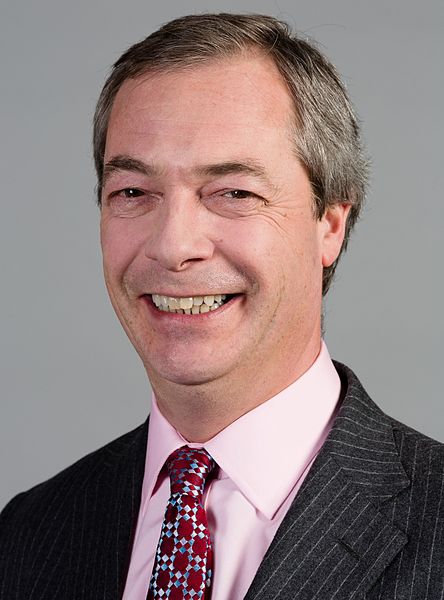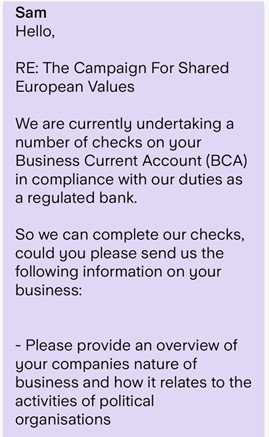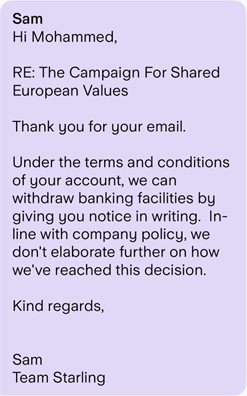 MohammedAmin.com
MohammedAmin.comSerious writing for
serious readers
The anti-money laundering rules, and related practice, are not working well, and need to be revised.
Summary
Posted 5 August 2023
Former UKIP leader Nigel Farage recently had his account with the up-market bank Coutts closed, leading to a great deal of news coverage.
If you have missed the story, there is a good short summary by Sky News: "Nigel Farage and NatWest: A timeline of what happened."
Banks are businesses providing a commercial service. Accordingly any bank is entitled to tell a customer to leave if the relationship is unprofitable for the bank. However in Mr Farage's case it is now clear that the closure was not for financial reasons.
While most Britons may have been surprised to learn that banks close accounts for non-financial reasons, many Muslims will not have been surprised. For many years Muslim charities and prominent Muslim individuals have had their bank accounts closed involuntarily for non-financial reasons.
See for example "Where were Nigel Farage and his defenders when Muslim bank accounts were shut down?"
I am one of the three directors of the Campaign for Shared European Values ("CSEV"). The organisation's "About Us" statement is copied below:
"We are a non-partisan advocacy organization dedicated to promoting and defending the values of the European project. Our mission is to advance the principles of the rule of law, tolerance, freedom, and liberty, and to foster a culture of respect for human rights and democratic governance throughout Europe."
While this may seem innocuous, CSEV recently had its bank account closed. While no reason was given, we have no reason to believe that this was for financial reasons. CSEV has written about the closure on its website, "Its not just Nigel Farage who gets debanked" and the article is reproduced below with the consent of my fellow directors.
My understanding of the banking industry from my career and from my being an investor leads me to have some sympathy for the banking industry. Governments around the world have introduced severe fines for engaging in money laundering. For example in 2012 HSBC was fined $1.9 billion by the US Government for money laundering failures in Mexico.
However as the CSEV article points out, banks seem to have reacted to such governmental pressure by picking off "soft targets" who have little money and who cannot pay for expensive lawyers to challenge such bank actions.
I consider that governments need to rewrite their money laundering laws, and change their enforcement practices, so that they are better targeted at serious cases of corruption and crime, instead of creating problems for small organisations.

Nigel Farage 2014
by David Iliff.
License: CC BY-SA 3.0
Buried within the story of whether Nigel Farage is rich enough to justify a bank account with Coutts is an issue of huge importance for democracy in Britain.
No – it’s not whether companies should be allowed to refuse to take people on as clients because of their views. It is the how the rules surrounding Politically Exposed Persons (“PEPs”) are applied.
Obviously, Mr Farage hasn’t mentioned this. Perhaps because it affects thousands of other people which eliminates his narrative that he is special, a martyr.
But speak to anyone in politics and they can to point you towards someone who has been refused a bank account or had a bank account closed.
In May, at the Campaign for Shared European Values, we received the following message from our bank, Starling.

We replied in great detail, including sending Starling Bank a copy of our accounts, to explain exactly what we do and how we are funded.
We concluded by summarising our objectives: “We would summarise our objectives as promoting, within the UK, understanding of our shared European heritage, values, human rights and the rule of law.”
Hardly incendiary, man-the-barricades, French Revolution sort of stuff.
After some delay, the next thing we got back from Starling Bank was the message below:

That was it. No reason given, and making it clear that they would not give us a reason. (We even tried asking for one!) We had been “debanked” as it is now called.
This practice clearly goes from the top to the bottom:
We began by claiming that this was important for democracy in Britain. That might seem slightly hyperbolic. But think about this.
At the last election, one of our directors was the election agent for a candidate from a major UK party. In line with his responsibilities under election law, he applied to open a campaign account to bank donations and to pay election expenses.
The bank he approached refused turned him away with the message “We cannot open a bank account for anyone involved in politics.”
There is a real risk that before the next general election (less than 18 months away), thousands of candidates and their election agents may end up in the same position. How will they be able to run their campaign finances?
The PEP rules were brought in because London had become a favourite place for corrupt foreign politicians to launder the money they had collected in bribes and stolen from their national treasuries. “No names, no pack drill!” But you may recognise the nickname “Londongrad.”
We don’t believe the rules have made much difference to corrupt foreign politicians. When you have billions, you can find lawyers, accountants and bankers who want to help you.
What the rules have done is encourage banks to “virtue signal.” They can show how seriously they take money laundering by being really tough with the “little people” such as MPs, their election agents, and people like us.
The government introduced the PEP rules, and it needs to fix them so that they stop hurting British democracy.
That is the real story. Not whether their Brexit buddy Nigel Farage needs to be kept happy.
Follow @Mohammed_Amin